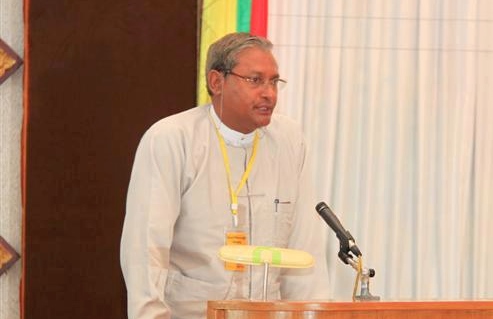As anticipation grows for Burma’s election later this year, the role of the Union Election Commission (UEC) and the constitutional foundations for the ballot are coming under increased scrutiny. Following a recent proposal to increase membership of the UEC, which currently stands at 18, DVB invited Supreme Court lawyer and member of the National League for Democracy’s committee on constitutional reform, Ko Ni, to give his take on the current state of affairs.
Q: The president’s proposal to restructure the UEC with eight more members came just six months before the election. What do you think are the grounds for this?
It is hard to understand this. Ideally, the UEC should be restructured about one year ahead of the election. This should include appointing more members as is necessary, and replacing unqualified members with new ones. But just adding more members on top of unqualified existing members won’t give them legitimacy – so we must question, how can an election organised by an illegitimate commission be in conformity with the law?
I have consistently suggested to the president [Thein Sein] that he reform the UEC in accordance with the law, as he has the power to do. He can choose anyone he likes to be part of the commission, just as long as they meet the qualifications given by law. Everything – our country’s dignity, the legitimacy of the elections – depends on the UEC, whose duty it is to act as a referee to ensure a fair game. My suggestion is that the UEC should indeed be restructured, but not just by adding more members.
Q: Opposition leader Aung San Suu Kyi told journalists in parliament on Wednesday that, without a fair constitution, the election can not be fair – and if the election is unfair, then the representativeness of parliament cannot be genuine. Do you think there is enough time to consider constitutional reform during the six months ahead of the election?
Daw Aung San Suu Kyi always said the election, no matter how free, cannot be fair without amending the constitution, and I believe it is a very significant point. As you know, the military is appointed 25 percent of the seats in parliament as provided for in the 2008 constitution. Those military MPs are USDP proxies. In a way, the NLD, since before the election, has already lost 25 percent of parliament, so there is no way we can call the election fair. On top of that, the individuals overseeing the election are on the ruling party’s side, so I don’t see enough grounds for assumption that the upcoming election will be clean and fair.
[related]
Q: How effective do you think the international pressure for a free and fair election is?
There is pressure to ensure a free and fair election from the international community, who are also sending observers to Burma. The problem is that the constitution lacks impartiality so the international community should focus more on monitoring how fair the polls are, regardless of the level of freedom. The election must be both free and fair.
Q: The Carter Center’s recent statement said that in order to form local-level commissions, the UEC has to rely on governmental administrations, which could affect the UEC’s impartiality.
That’s right. All the election commission offices at a local level are tied to township, or village, or ward, administrations. Right now, the ruling power of the country is definitely not in the hands of civilians. The Minister of Home Affairs Gen. Ko Ko was appointed this position by the Tatmadaw [Burmese military] commander-in-chief. To be frank, Burma is still governed by the military, and the election will test the balance between a military-backed party and a civilian party. It would be ideal if the election commission could be separated from the executive sector, otherwise there will be controversy.
Q: How do you think the UEC should be structured to meet international standards?
The UEC is currently made up of governmental personnel. From an international point of view, this is good practice because theoretically, government workers are free from party favouritism. The problem in our country is that these civil servants lived under military rule for such a long time, they have a deep-rooted tradition of following government orders. They were taught not to stand on the side of the people, but just to follow instructions from the government, the executive sector. I believe that it will take a lot to fix that. Under these conditions, the election commission is incapable of ensuring free and fair elections. In order to ensure impartiality among the UEC members, the commissions must be restructured at township level by adopting systematic requirements and regulations.



